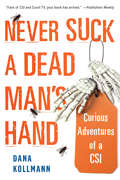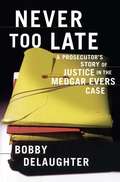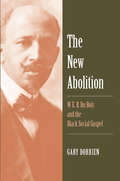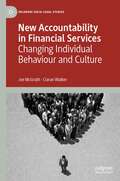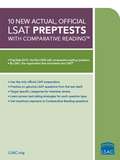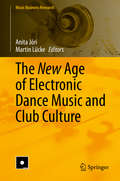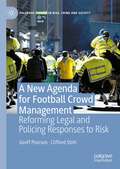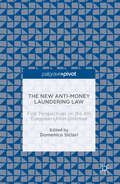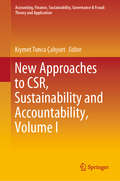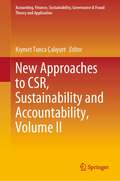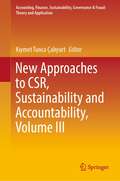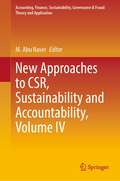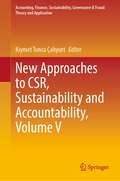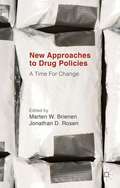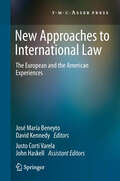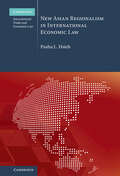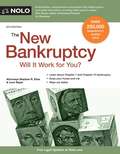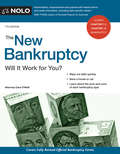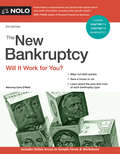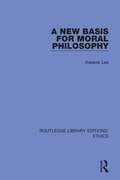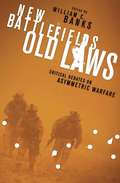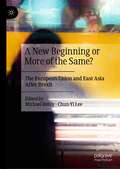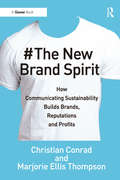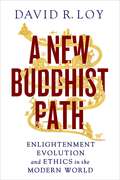- Table View
- List View
Never Suck a Dead Man's Hand: Curious Adventures Of A Csi (Crime Scene Ser.)
by Dana Kollmann"Informative, witty. . . Kollmann delivers terse commentary and gory detail while puncturing common misconceptions about forensics. " --Booklist Step past the flashing lights into the true scene of the crime with this frank, unflinching, and unforgettable account of life as a crime scene investigator. Whether explaining rigor mortis or the art of fingerprinting a stiff corpse on the side of the road, Dana Kollmann details her true, unvarnished experiences as a CSI for the Baltimore County Police Department. "Riveting. " --M. William Phelps, author of Murder in the Heartland Unlike the popular crime dramas proliferating on today's television networks, these forensic tales forgo glitz for grit to show what really goes on. Kollmann recounts stories that the cops and the CSI's usually leave in the field, bringing the sights, smells, and sounds of a crime scene alive as never before. "Raw and real. " --Connie Fletcher, author of Every Contact Leaves a Trace Unveiling the process and science of crime scene investigation in all its can't-tear-your-eyes-away fascination, Never Suck a Dead Man's Hand takes you into the strange world behind the yellow tape, offering a truly eye-opening perspective on the day-to-day life of a CSI. "Gritty, witty, and heartfelt . . . a must-read. " --Aphrodite Jones, New York Times bestselling author of A Perfect Husband
Never Too Late
by Bobby DelaughterIn June 12, 1963, Mississippi's fast-rising NAACP leader Medgar Evers was gunned down by a white supremacist named Byron De La Beckwith. Beckwith escaped conviction twice at the hands of all-white Southern juries, and his crime went unpunished for more than three decades. Now, from Bobby DeLaughter, one of the most celebrated prosecutors in modern American law, comes the blistering account of his remarkable crusade in 1994 finally to bring the assassin of Medgar Evers to justice. This is the fascinating, real-life story of the assistant district attorney -- played by Alec Baldwin in Rob Reiner's Ghosts of Mississippi -- who brought closure to one of the darkest chapters of the civil rights movement. When the district attorney's office in Jackson, Mississippi, decided to reopen the case, the obstacles in its way were overwhelming: missing court records; transcripts that were more than thirty years old; original evidence that had been lost; new testimony that had to be taken regarding long-ago events; and the perception throughout the state that a reprosecution was a futile endeavor. But step by painstaking step, DeLaughter and his team overcame the obstacles and built their case. With taut prose that reads like a great detective thriller, Never Too Late is a page-turner of the very highest order. It charts the course of a country lawyer who, concerned about the collective soul of his community and the nature of American justice in general, dared to revisit a thirty-one-year-old case -- one so incendiary that everyone warned him not to touch it -- and win a long-overdue conviction. DeLaughter's success in this trial stands today as a landmark in the annals of criminal prosecution, and this bracing first-person account brings the saga to life as never before.
The New Abolition
by Gary DorrienThe black social gospel emerged from the trauma of Reconstruction to ask what a "new abolition" would require in American society. It became an important tradition of religious thought and resistance, helping to create an alternative public sphere of excluded voices and providing the intellectual underpinnings of the civil rights movement. This tradition has been seriously overlooked, despite its immense legacy. In this groundbreaking work, Gary Dorrien describes the early history of the black social gospel from its nineteenth-century founding to its close association in the twentieth century with W. E. B. Du Bois. He offers a new perspective on modern Christianity and the civil rights era by delineating the tradition of social justice theology and activism that led to Martin Luther King Jr. "
New Accountability in Financial Services: Changing Individual Behaviour and Culture (Palgrave Socio-Legal Studies)
by Joe McGrath Ciaran WalkerThis book is a critical examination of recently introduced individual accountability regimes that apply to the financial services industry in the UK (SMCR) and Australia (BEAR and the forthcoming FAR), together with a forthcoming new individual accountability regime ( in particular, SEAR) in Ireland. It provides a framework for analysing whether these regimes will achieve behavioural change in the financial services industry. This book argues that, whilst sanctioning individuals to deter future misconduct is an important part of any successful regulatory strategy, the focus should be on ensuring that individuals in the financial services industry internalise the norms of behaviour expected under the new regimes. In this regard, the analysis in this book is informed by criminological theory, regulatory theory and behavioural science. The work also argues for a “trajectory towards professionalisation” of financial services, and banking in particular, as an important means of positively influencing industry-wide norms of behaviour, which have a key influence on firms’ and individuals’ behaviours.
New Actual, Official LSAT Preptests with Comparative Reading
by Law School Admission CouncilThis essential LSAT preparation tool encompasses PrepTest 52 (the September 2007 LSAT) through PrepTest 61 (the October 2010 LSAT).
The New Age of Electronic Dance Music and Club Culture (Music Business Research)
by Martin Lücke Anita JóriThis book offers a comprehensive overview of electronic dance music (EDM) and club culture. To do so, it interlinks a broad range of disciplines, revealing their (at times vastly) differing standpoints on the same subject. Scholars from such diverse fields as cultural studies, economics, linguistics, media studies, musicology, philosophy, and sociology share their perspectives. In addition, the book features articles by practitioners who have been active on the EDM scene for many years and discuss issues like gender and diversity problems in general, and the effects of gentrification on club culture in Berlin. Although the book’s main focus is on Berlin, one of the key centers of EDM and club culture, its findings can also be applied to other hotspots. Though primarily intended for researchers and students, the book will benefit all readers interested in obtaining an interdisciplinary overview of research on electronic dance music.
A New Agenda For Football Crowd Management: Reforming Legal and Policing Responses to Risk (Palgrave Studies in Risk, Crime and Society)
by Geoff Pearson Clifford StottThis book provides a holistic and interdisciplinary focus on the legal regulation and policing of football violence and disorder in Britain. Anchored in ground-breaking ethnographic and participant-action research, the book combines a crowd psychology and socio-legal approach to critically explore the contemporary challenges of managing football crowds. It sets out the processes by which football disorder occurs and the limitations of existing approaches to policing ‘football hooliganism’, in particular the dominant focus on controlling ‘risk supporters’, before setting out proposals for fundamental reforms to both law and policing. This book will be of value to academics, students, legal and policing practitioners, as well as policy-makers. The two authors are internationally known experts in the management and behaviour of football crowds and bring together for the first time over 30 years of research in this area from the disciplines of law and social psychology.
The New Anti-Money Laundering Law
by Domenico SiclariThis book introduces andcontextualizes the revised and strengthened legislation on the laundering ofcriminal funds mandated by the European Union on the 20th May 2015. The authors provide fresh and new insight into the EU's fourth directive2015/849, with a specific focus on topics such as: beneficial ownership andeffective transparency, the risk-based approach, the issue of supervision ofpayment institutions that operate across borders by agents, the new method ofrisk assessment, tax crimes inclusion in "criminal activity" definition, andthe effects of new rules on the gambling sector. The authors present the newlaws in the context of their legal genealogy and demonstrate the benefits theybring in raising the standards for anti-money laundering regulation andcounter-terrorism financing. The book's comprehensiveexploration of this new legislation will appeal to policy-makers, students andacademics hoping to understand the changes more clearly.
New Approaches to CSR, Sustainability and Accountability, Volume I (Accounting, Finance, Sustainability, Governance & Fraud: Theory and Application)
by Kıymet Tunca ÇalıyurtThis book provides a platform for discussing the challenges that organizations face in order to implement sustainability, ethics, and effective corporate governance, all of which are important elements of “standing out” from other companies. Examining the background of the New European Consensus on development with the new guiding motto ‘Our World, Our Dignity, Our Future’, the authors explore how this new legislation on sustainability issues around the world is forcing companies to deal directly with sustainability issues. The 2030 Agenda for Sustainable Development (2030 Agenda), adopted by the United Nations in September 2015, is the international community’s response to global challenges and trends in connection with sustainable development. With the Sustainable Development Goals (SDGs) at its core, the 2030 Agenda is a transformative political framework designed to eradicate poverty and achieve sustainable development globally. It balances the economic, social and environmental dimensions of sustainable development, including the key issues of governance and peaceful and inclusive societies, and recognizes the essential interlinkages between its goals and targets, i.e., that they must be implemented as a whole and not selectively. The respective chapters in this volume raise a number of questions regarding companies’ ability to implement sustainability, ethics, and effective corporate governance. Simultaneously, they explore how organizations must adapt to sustainability-related developments.
New Approaches to CSR, Sustainability and Accountability, Volume II (Accounting, Finance, Sustainability, Governance & Fraud: Theory and Application)
by Kıymet Tunca ÇalıyurtThis book continues the discussion on the challenges that organizations face in order to implement sustainability, ethics, and effective corporate governance, all of which are important elements of “standing out” from other companies. Examining the background of the New European Consensus on development with the new guiding motto ‘Our World, Our Dignity, Our Future,’ the authors explore how this new legislation on sustainability issues around the world is forcing companies to deal directly with sustainability issues.The 2030 Agenda for Sustainable Development (2030 Agenda), adopted by the United Nations in September 2015, is the international community’s response to global challenges and trends in connection with sustainable development. With the Sustainable Development Goals (SDGs) at its core, the 2030 Agenda is a transformative political framework designed to eradicate poverty and achieve sustainable development globally. It balances the economic, social, and environmental dimensions of sustainable development, including the key issues of governance and peaceful and inclusive societies, and recognizes the essential interlinkages between its goals and targets, i.e., that they must be implemented as a whole and not selectively. The respective chapters in this volume raise a number of questions regarding corporate social responsibility, ethics, and corporate governance in the face of new technology, and new approaches to climate change and sustainability reporting.
New Approaches to CSR, Sustainability and Accountability, Volume III (Accounting, Finance, Sustainability, Governance & Fraud: Theory and Application)
by Kıymet Tunca ÇalıyurtThis book continues the discussion in the first two volumes on the challenges that organizations face in order to implement sustainability, ethics, and effective corporate governance, all of which are important elements of “standing out” from other companies. Examining the background of the New European Consensus on development with the new guiding motto ‘Our World, Our Dignity, Our Future,’ the authors explore how this new legislation on sustainability issues around the world is forcing companies to deal directly with sustainability issues.The 2030 Agenda for Sustainable Development (2030 Agenda), adopted by the United Nations in September 2015, is the international community’s response to global challenges and trends in connection with sustainable development. With the Sustainable Development Goals (SDGs) at its core, the 2030 Agenda is a transformative political framework designed to eradicate poverty and achieve sustainable development globally. It balances the economic, social, and environmental dimensions of sustainable development, including the key issues of governance and peaceful and inclusive societies, and recognizes the essential interlinkages between its goals and targets, i.e., that they must be implemented as a whole and not selectively. The respective chapters in this volume raise a number of questions regarding corporate social responsibility, ethics, and corporate governance in the face of new technology, and new approaches to climate change and sustainability reporting.
New Approaches to CSR, Sustainability and Accountability, Volume IV (Accounting, Finance, Sustainability, Governance & Fraud: Theory and Application)
by M. Abu NaserThis book continues the discussion on the challenges that organizations face in order to implement sustainability, ethics, and effective corporate governance, all of which are important elements of “standing out” from other companies. Examining the background of the New European Consensus on development with the new guiding motto ‘Our World, Our Dignity, Our Future,’ the authors explore how this new legislation on sustainability issues around the world is forcing companies to deal directly with sustainability issues.The 2030 Agenda for Sustainable Development (2030 Agenda), adopted by the United Nations in September 2015, is the international community’s response to global challenges and trends in connection with sustainable development. With the Sustainable Development Goals (SDGs) at its core, the 2030 Agenda is a transformative political framework designed to eradicate poverty and achieve sustainable development globally. It balances the economic, social, and environmental dimensions of sustainable development, including the key issues of governance and peaceful and inclusive societies, and recognizes the essential interlinkages between its goals and targets, i.e., that they must be implemented as a whole and not selectively. The respective chapters in this volume raise a number of questions regarding corporate social responsibility, ethics, and corporate governance in the face of new technology, and new approaches to climate change and sustainability reporting.
New Approaches to CSR, Sustainability and Accountability, Volume V (Accounting, Finance, Sustainability, Governance & Fraud: Theory and Application)
by Kıymet Tunca ÇalıyurtThis book continues the discussion from the first four volumes on the challenges that organizations face in order to implement sustainability, ethics, and effective corporate governance, all of which are important elements of “standing out” from other companies. Examining the background of the New European Consensus on development with the new guiding motto ‘Our World, Our Dignity, Our Future,’ the authors explore how this new legislation on sustainability issues around the world is forcing companies to deal directly with sustainability issues. The 2030 Agenda for Sustainable Development (2030 Agenda), adopted by the United Nations in September 2015, is the international community’s response to global challenges and trends in connection with sustainable development. With the Sustainable Development Goals (SDGs) at its core, the 2030 Agenda is a transformative political framework designed to eradicate poverty and achieve sustainable development globally. It balances the economic, social, and environmental dimensions of sustainable development, including the key issues of governance and peaceful and inclusive societies, and recognizes the essential interlinkages between its goals and targets, i.e., that they must be implemented as a whole and not selectively. The respective chapters in this volume raise a number of questions regarding corporate social responsibility, ethics, and corporate governance in the face of new technology and new approaches to climate change and sustainability reporting.
New Approaches to Drug Policies: A Time for Change
by Marten W. Brienen Jonathan D. RosenThe U. S. -led war on drugs has failed: drugs remain purer, cheaper and more readily available than when the war on drugs began in 1971. The drug war also has resulted in extreme levels of violence as drug traffickers and organized criminals compete for control of territory. Prohibitionist policies have destroyed the lives of millions of people as prisons warehouse drug offenders. This important volume represents an effort to map new approaches to drug policies. The contributors write from various disciplinary backgrounds and provide crucial insights on a wide-range of topics, including the gang-drug nexus, delinquency, legalization, trafficking, decriminalization, intervention programs and prison reform. This volume also provides a number of policy solutions and alternatives to the current drug strategies. Includes contributions from: Marten W. Brienen, Ted Galen Carpenter, Roger G. Dunham, Gregory Fulkerson, Betty Horwitz, Caitlin Elizabeth Hughes, Hanna Samir Kassab, Ana Maria Lobos, Bradford R. McGuinn, Fida Mohammad, Keri O'Neal, J. Bryan Page, Susan A. Phillips, Vanessa Rayan, Jonathan D. Rosen, Alex Stevens, Steven L. West, and Marcelo Rocha e Silva Zorovich.
New Approaches to International Law
by David Kennedy John Haskell José María Beneyto Justo Corti VarelaThis volume offers a unique reflection on the historic and contemporary influence of the New Approaches to International Law (NAIL) movement within the context of Europe and America. In particular, the contributions focus on the intellectual product of NAIL's founder, David Kennedy, in relation to three legal streams: human rights, legal history, and the law of war. On the one hand, the volume is valuable reading for a broad audience interested in the current challenges facing global governance, and how critical studies might contribute to innovative intellectual and practice-oriented developments in international law. On the other hand, stemming from a 2010 seminar in Madrid that brought together scholars to discuss David Kennedy's scholarship over the last three decades, the contributions here are a testament to the community and ideas of the NAIL tradition. The volume includes scholars from a wide field of legal interests and backgrounds.
New Asian Regionalism in International Economic Law (Cambridge International Trade and Economic Law)
by Pasha L. HsiehThis book provides the first systematic analysis of new Asian regionalism as a paradigm shift in international economic law. It argues that new Asian regionalism has emerged amid the Third Regionalism and contributed to the New Regional Economic Order, which reinvigorates the role of developing countries in shaping international trade norms. To substantiate the claims, the book introduces theoretical debates and evaluates major regional economic initiatives and institutions, including the ASEAN+6 framework, APEC, the CPTPP and the RCEP. It also sheds light on legal issues involving the US-China trade war and the COVID-19 pandemic, as well as trade policies of Asian powers, the European Union and the United States. Hence, the legal analysis and case studies offer a fresh perspective of Asian integration and bridge the gap between academia and practice.
New Bankruptcy,The
by Stephen Elias Leon BayerConsidering bankruptcy? Get the facts and find out how bankruptcy could work for you. Bankruptcy laws have changed, and figuring out how to use them effectively is harder than ever. For plain-English guidance you can trust, turn to The New Bankruptcy. Get the strategies, clear-cut answers, and information and you need to figure out whether bankruptcy is the right solution for your debt problems. Find out: -if you qualify for Chapter 7 bankruptcy -how Chapter 13 repayment plans work -which debts are wiped out -how bankruptcy affects homeowners -if you can keep cars and other property -how bankruptcy affects credit -alternative ways to handle debt problems This edition includes updated state and federal exemption tables, plus information on recent Supreme Court cases used to interpret 2005 bankruptcy changes. You'll also get worksheets to help you determine whether you can file for bankruptcy, including fully up-to-date exemption charts, helpful checklists, and easy-to-use legal charts for all 50 states.
New Bankruptcy, The: Will It Work for You?
by Stephen Elias Leon BayerChoose the best bankruptcy option The New Bankruptcy provides clear-cut information, answers to common questions, worksheets, and strategies to help you figure out whether bankruptcy is the right solution to your debt problem. Find out: the main differences between Chapter 7 and Chapter 13 bankruptcy whether you qualify for Chapter 7 bankruptcy (the means test) how the Chapter 13 repayment plan works which type of bankruptcy (7 or 13) is better in various situations which debts are wiped out what happens to your property, including your home, car, and retirement accounts, and other ways to handle debt problems. The book also outlines the bankruptcy process and includes completed sample bankruptcy forms.
New Bankruptcy, The: Will It Work for You?
by Cara O'NeillNot sure where to start? Let’s find the right bankruptcy option for you. You know bankruptcy will help you get back on your financial feet. But which chapter type is best? The New Bankruptcy explains the benefits of Chapter 7 and Chapter 13 bankruptcy. You’ll learn that Chapter 7 bankruptcy will: Not sure where to start? Let’s find the right bankruptcy option for you. wipe out credit card balances, utility bills, and more protect property you need to work and live, and take about four to six months to complete. Chapter 13 bankruptcy works by keeping creditors at bay while you: catch up on a house or car payment pay off an overdue tax or support balance, and pay less on other debt, such as credit cards and student loans. The 8th edition’s expanded online companion page includes downloadable worksheets and easy-to-use charts, as well as a sample bankruptcy filing on the latest official legal forms.
A New Basis for Moral Philosophy
by Keekok LeeOriginally published in 1985, this book establishes that moral discourse is critical, rational and objective and challenges the ideology of value irrationalism behind contemporary liberalism. The book discusses the origins of the fact/value distinction, and calls into question the thesis that logical derivability or strict implication is the only legitimate relationship between propositions. A straightforward philosophical treatment of the subject, in the analytical tradition, it will be especially useful for undergraduate students.
New Battlefields/Old Laws: Critical Debates on Asymmetric Warfare (Columbia Studies in Terrorism and Irregular Warfare)
by William BanksAn internationally-recognized authority on constitutional law, national security law, and counterterrorism, William C. Banks believes changing patterns of global conflict are forcing a reexamination of the traditional laws of war. The Hague Rules, the customary laws of war, and the post-1949 law of armed conflict no longer account for nonstate groups waging prolonged campaigns of terrorism—or even more conventional insurgent attacks. Recognizing that many of today's conflicts are low-intensity, asymmetrical wars fought between disparate military forces, Banks's collection analyzes nonstate armed groups and irregular forces (such as terrorist and insurgent groups, paramilitaries, child soldiers, civilians participating in hostilities, and private military firms) and their challenge to international humanitarian law. Both he and his contributors believe gaps in the laws of war leave modern battlefields largely unregulated, and they fear state parties suffer without guidelines for responding to terrorists and their asymmetrical tactics, such as the targeting of civilians. These gaps also embolden weaker, nonstate combatants to exploit forbidden strategies and violate the laws of war. Attuned to the contested nature of post-9/11 security and policy, this collection juxtaposes diverse perspectives on existing laws and their application in contemporary conflict. It sets forth a legal definition of new wars, describes the status of new actors, charts the evolution of the twenty-first-century battlefield, and balances humanitarian priorities with military necessity. While the contributors contest each other, they ultimately reestablish the legitimacy of a long-standing legal corpus, and they rehumanize an environment in which the most vulnerable targets, civilian populations, are themselves becoming weapons against conventional power.
A New Beginning or More of the Same?: The European Union and East Asia After Brexit
by Michael Reilly Chun-Yi LeeThe EU’s interest in and engagement with North East Asia has grown massively over the last three decades, the shaping and implementation of its policy influenced heavily by the UK and its historical links with East Asia. Brexit therefore raises questions about the future of this engagement and comes against a background of wider threats to the liberal world order, especially rising tensions between the USA and China. Worried that they may be forced to choose sides in their hitherto carefully managed relationships with the two, China’s neighbours are therefore watching with interest to see how the EU and the UK respond and manage their future relations with the region. This book goes beyond the traditional trade links to consider diplomatic and security perspectives, as well as wider issues such as the possible impact on educational and research links. It will be of interest to diplomats, scholars, and economists.
The New Brand Spirit: How Communicating Sustainability Builds Brands, Reputations and Profits
by Christian Conrad Marjorie Ellis ThompsonEffective sustainability communication can deliver business value. Get it wrong, however, and the reputational damage will be costly. Stakeholders, and the general public as well as activists, are unforgiving of companies whose products, services, business practices or culture fall short of their socially responsible rhetoric. Based on close to one hundred in-depth interviews with leading experts, Christian Conrad and Marjorie Thompson's The New Brand Spirit helps corporate communications and marketing professionals tackle this conundrum by providing a first-hand view of eight distinct and relevant stakeholder perspectives. Nineteen comprehensive and well-researched best practice cases from sustainability leaders like IBM, Unilever, Marks & Spencer and Puma will inspire all those tasked with communicating sustainability with practical and applicable tools and lessons learned. The result is a book that will enable senior executives, corporate communication professionals and brand managers to decide when, to whom and how to communicate sustainability related messages - and when not to.
A New Buddhist Path
by David R. LoyEngage with a new vision of Buddhism and the modern world with the bestselling author of Money Sex War Karma: Notes for a Buddhist Revolution.David R. Loy addresses head-on the most pressing issues of Buddhist philosophy in our time. What is the meaning of enlightenment--is it an escape from the world, or is it a form of psychological healing? How can one reconcile modern scientific theory with ancient religious teachings? What is our role in the universe? Loy shows us that neither Buddhism nor secular society by itself is sufficient to answer these questions. Instead, he investigates the unexpected intersections of the two. Through this exchange, he uncovers a new Buddhist way, one that is faithful to the important traditions of Buddhism but compatible with modernity. This way, we can see the world as it is truly is, realize our indivisibility from it, and learn that the world's problems are our problems. This is a new path for a new world.
A New Buddhist Path: Enlightenment, Evolution, and Ethics in the Modern World
by David R. LoyEngage with a new vision of Buddhism and the modern world with the bestselling author of Money Sex War Karma: Notes for a Buddhist Revolution.David R. Loy addresses head-on the most pressing issues of Buddhist philosophy in our time. What is the meaning of enlightenment--is it an escape from the world, or is it a form of psychological healing? How can one reconcile modern scientific theory with ancient religious teachings? What is our role in the universe? Loy shows us that neither Buddhism nor secular society by itself is sufficient to answer these questions. Instead, he investigates the unexpected intersections of the two. Through this exchange, he uncovers a new Buddhist way, one that is faithful to the important traditions of Buddhism but compatible with modernity. This way, we can see the world as it is truly is, realize our indivisibility from it, and learn that the world's problems are our problems. This is a new path for a new world.
